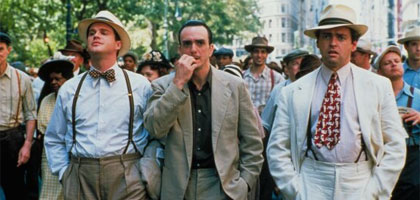
It's almost all true
Film of the Month: Cradle Will Rock

Tim Robbins' backstage quasi-musical about the ill-fated Orson Welles production of Cradle Will Rock joyfully recreates an era while saluting the men and women involved. By Philip Strick
Introducing itself as "a (mostly) true story", Cradle Will Rock depicts the events and characters surrounding the 1936 stage production of composer Marc Blitzstein's "play with music" Cradle Will Rock, directed by Orson Welles and financed by the left-wing Federal Theater Project. The story is passingly familiar to Orson Welles admirers but otherwise so long overlooked several of director Tim Robbins' own production unit for this film assumed he was making it all up. Authentication of the key events can be found in John Houseman's autobiography Unfinished Business with its wry, admiring account of the theatrical coup achieved by boy-wonder Welles between making an all-black theatre production of Macbeth and his first film Citizen Kane (1941). But Welles plays only a small part in Robbins' complex reconstruction, assembled with the generosity of an anthologist reluctant to bypass good colourful material, particularly when it substantiates his main purpose. Given, for instance, that Blitzstein first showed his dramatic sketch for the play to Bertold Brecht (to whom Cradle Will Rock was dedicated), Robbins writes a 'ghost' Brecht into the film's action, creating another of the alternative realities which have haunted his previous films.
The unreliable senatorial campaigner in Bob Roberts and the self-deluding killer in Dead Man Walking neatly prepare the trail for Robbins' latest anti-authoritarian venture. Both characters have their deadly charm and illustrate a bigotry Robbins would find more amusing if it weren't so universal and sinister. In chilling anticipation of the McCarthy era, here a blustering congressman demands to know whether Christopher Marlowe (1564-93) is known to have Communist sympathies. And this clumsy phobia is equally apparent in desk-clerk Hazel Huffman (Joan Cusack) who suspects a pro-Russian agenda in the Federal Theater's affairs, the office staff who turn against her, and the people who misinterpret the daft children's pantomime The Eager Beaver as an allegory about workers versus capitalists. Even the best intentions of Nelson Rockefeller (John Cusack) turn repressive in a subplot after artist Diego Rivera (Rubén Blades) proves intransigent over the subject of his mural for the Rockefeller Center. "Nothing in art is inappropriate," growls Rivera, a sentiment heartily endorsed by Robbins' screenplay which freely appropriates whatever it pleases.
The stifling of such freedom is naturally Robbins' major concern, and his films are fashioned from constraints and barriers, perpetual gulfs in communication. Dead Man Walking is a long succession of faces framed by prison bars, reappearing in Cradle with Blitzstein's imaginary private prison. A key victim in this society where free speech can spell ruin is the ventriloquist Tommy Crickshaw (Bill Murray), so dumbfounded by his collapsing world and the students who steal his routine he can barely talk except through an ungainly puppet. The agonising interdependence between the magician and the torments he has devised for himself afflicts all the puppetmasters in Cradle Will Rock, from William Randolph Hearst and Rockefeller to Blitzstein (Hank Azaria) and Rivera. In each case, the puppets finally speak up for themselves. And Crickshaw's alter ego remains alone on stage singing 'L'Internationale' to a bewildered audience until it is carried away in a coffin down Broadway.
The many parallel productions within Cradle Will Rock all conclude with a similar uncertainty, rather like the series of concerts in Bob Roberts where the refrains are so extreme ("Hang 'em high," he sings of drug dealers) that the voting public could hardly be expected to take them seriously. Crickshaw's act, Rivera's mural, the Eager Beavers, even the rehearsal for Welles' production of Doctor Faustus (in which the Seven Deadly Sins were portrayed by a "sinister puppet troupe"), are all brought to an untimely end, foreshadowing the disintegration of the Federal Theater Project itself. Less prominent performances - the fancy-dress ball, Carlo's diabolical piano concert or the behind-the-scenes steering of the Dies Committee radio-show witch hunt - also echo the arduous shaping of Blitzstein's composition, destined only for cancellation.
"I've always wanted to observe the process of art-making!" chirps art patron Countess La Grange (Vanessa Redgrave) in part-apology, one suspects, for Robbins himself who, floating his camera above a phalanx of spinning plates on the vaudeville stage, clearly regards art-making as a balancing act. From the title onwards, his film concerns itself with stability, as much in romance as in politics, as much in post-Depression recovery as in the symmetry of a single mural, as much in the Welles-Houseman unit (an alliance of opposites) as in the juggling task Robbins has set himself. It makes for quite a display of dexterity.
Striving to maintain the film's range of checks and balances is an impressive army of female activists, rebels with whole-hearted causes. With an appealing precision, each is challenged by a partner/opponent. The vulnerable Olive (Emily Watson) finds and loses an urbane union leader; the Italian fundraiser Margherita Sarfatti (Susan Sarandon) finds her match in Rivera; the redoubtable Hallie (Cherry Jones) does battle with the icy congressman; and the Countess skirmishes with her wearily wealthy husband (Philip Baker Hall). Even as would-be actor Aldo (John Turturro) is being warned by his wife (Barbara Sukowa) that Cradle Will Rock is a risky venture, Blitzstein is being warned from beyond the grave by his wife (Susan Heimbinder) he hasn't had enough sleep.
From his serpentine opening shot, Robbins would have us believe Olive is at his story's centre. Certainly her enterprise is what rescues the performance from being just a solo recital, but she is quickly absorbed by the collective participation of the entire cast. The cunning of Robbins' Wellesian dialogue lies in the amount of information it contrives to share about Roosevelt's New Deal and the rise of Mussolini, while linking Olive's plight with the song being composed in Blitzstein's studio at that very moment, a song she will eventually sing. At the same time, the booming newsreel commentary speaks of "hope for the future", exactly the theme proposed by Rockefeller for Rivera's mural.
As the story closes, all that remains of the mural is a fragment, reminding us that the near future for the Cradle generation is in fact painfully short of hope. But Robbins is disinclined towards gloom and turns the climactic Cradle performance (a touch misleadingly shown through a collection of passionate extracts) into a welter of praise and euphoria, as if by sheer force of goodwill the political tide could have been reversed. Houseman reported that apart from Blitzstein's piano only one other instrument, an accordion, accompanied the show, but the film adds several extras and the soundtrack knows no limits. While sharing Blitzstein's affection for sung drama (apparently inspired by a combination of The Threepenny Opera and Gilbert and Sullivan), Robbins concentrates on celebrating his cast and design team. With its sudden explosions of visual energy - the fancy-dress ball, the wild dance at Rivera's studio, the street parade - and its cascade of fine performances (the verbal sparring between Cary Elwes as Houseman and Angus MacFadyen as Welles provides particular enjoyment), Cradle Will Rock may not be all true but provides a concert of admirable variations.
